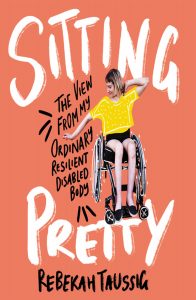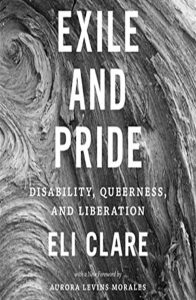

By Heather Kuttai
July is Disability Pride Month. In a world where we often see life in binary ways – good or bad, joyous or sorrowful, all or nothing – having and celebrating disabilities can be tricky. Disability identity is complicated, layered, contradictory, and has been theorized and written about for decades. The body, the experience of the body, and the emotional impact of those experiences, matters as much as the social world of barriers. Two books that explore both social systems as well as disabled bodies and how they fit (and often do not fit) in our world deserve highlight here: Sitting Pretty by Rebekah Taussig and Exile and Pride by Eli Clare. Both are critical memoirs that include disability theory, where the authors reflect on the social world and its systems by intertwining their critical examinations of the self. Both books are also unreservedly honest, which makes them accessible and easy to read, but hard-hitting and raw at the same time.
Through her memoir of essays, Taussig takes us through the chronology of her life up to this point. Through storytelling, she shows us how inaccessibility and ableism work to keep people with disabilities from participating in social life, but more importantly, how they keep the idea of disability as a “deficit” and how, until that changes, disabled people will always be considered inferior and justifiably oppressed. Taussig says, we need to rethink how we design our society – not just accessible spaces but go beyond that to think about the social conventions we currently take as normal. At the beginning of Sitting Pretty she writes, “I wish for all of us – a world where we are all free to move, to exist in our bodies without shame; a world that isn’t interested in making all of its human operate in the exact same way; a world that instead strives to invite more, include more, imagine more.” (p16).
Eli Clare also imagines such a world. And while he identifies as a white disabled genderqueer person, Exile and Pride is not only a book about disability and queerness. It is also a book for anyone who wants to understand a more complex and intersectional framework for understanding how all bodies experience the politics of oppression, power, and justice. His story weaves together reflections on environmental destruction, white working-class identities, queer communities, disability experiences, sexuality, devastating childhood sexual abuse, history, politics, and his own gender transition into a call for action: disability pride. “Pride is not an inessential thing.Without pride, disabled people are much more likely to accept unquestioningly the daily material conditions of ableism,” writes Clare. Later saying, “Without pride, individual and collective resistance to oppression becomes nearly impossible.” (p 107)
Both Sitting Pretty and Exile and Pride challenge readers to see past their notions of what good, normal, healthy bodies are, and push for a more inclusive world. Both books also discuss how inclusivity is about a great deal more than simply building ramps. They dare us to consider that all bodies are good bodies, and that all bodies shape the world and tell stories of what it means to be human.
Happy Disability Pride.
